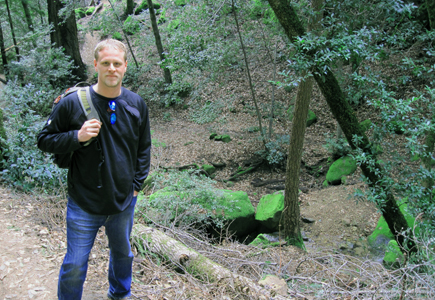
Brian Lewis
Systems Engineer - NASA Ames Research Center
I'm from Blackfoot, Idaho. It's a small town of about 10,000 people in south-eastern Idaho.
As a child I would go camping with my family in Idaho, Montana and Wyoming. There, away from the city-lights, would be amazing and beautiful views of the stars. I remember watching the stars and wondering what else could be out there to find and see -- I am sure there are many just like me who felt this way while looking at the immenseness of space through clear and dark skies.
Also, it may sound a bit strange, but I remember the Space Shuttle Challenger disaster as a child. I was about nine-years old at the time and the fact that something which seemed so sturdy could have problems made me interested in understanding how it and other things worked.
While in college at Utah State University, I happened to attend a meeting for a student project that was going to build some small spacecraft for the United States Air Force (USAF). (It was a collaborative project done with USAF, NASA and several universities.) We worked for a couple of years in order to build that spacecraft. After school, I was talking with a former professor and he mentioned that a company in Los Angeles called the Aerospace Corporation where he had worked was looking for someone who had worked on small spacecraft. I applied and got a job working on NASA and USAF programs.
Carl Sagan always makes me think about the philosophy and science behind the engineering. At times you can get caught up in the day to day activities and lose sight of how amazing it is that we've been able to send robots all over our solar system. We have learned so much -- more than our ancestors would have ever imagined possible.
A spacecraft is built of a lot of different components which require people with backgrounds in many different disciplines: computer science, mechanical engineering, materials science, electrical engineering, radio-frequency engineering, and so on. A design that is optimal for one of those disciplines may be very inefficient for another. A systems engineer typically works to balance all those designs to optimize the system as a whole and ensure that the parts work as required when brought together.
I worked on NASA's Mars Science Laboratory (MSL) several years ago -- back when the first ideas were coming together on how NASA would land a much larger vehicle than previously attempted on Mars. Watching the team successfully land the vehicle in August 2012 was very exciting for me, even though I was not a part of the team during landing.
Try to learn as much as you can, about as many things as you can. I studied mechanical engineering, but I was also interested in other areas. I asked enough questions about power systems, radios and software that I was able to broaden my skill sets and work in areas other than mechanical engineering and design.
I enjoy live music a great deal and can be found at a variety of concerts around the Bay Area. I also play soccer, basketball and softball in my off-hours, or at least I did before tearing my ACL. I'm currently working on rehabilitating my knee so that I can get back to playing again soon.
Stick with it. We all get frustrated from time to time, so find time to do things that will help to clear your mind. Often your brain will be processing while you're not directly thinking about your studies -- things will "click" when you don't expect them.
Planetary science is a global profession.

